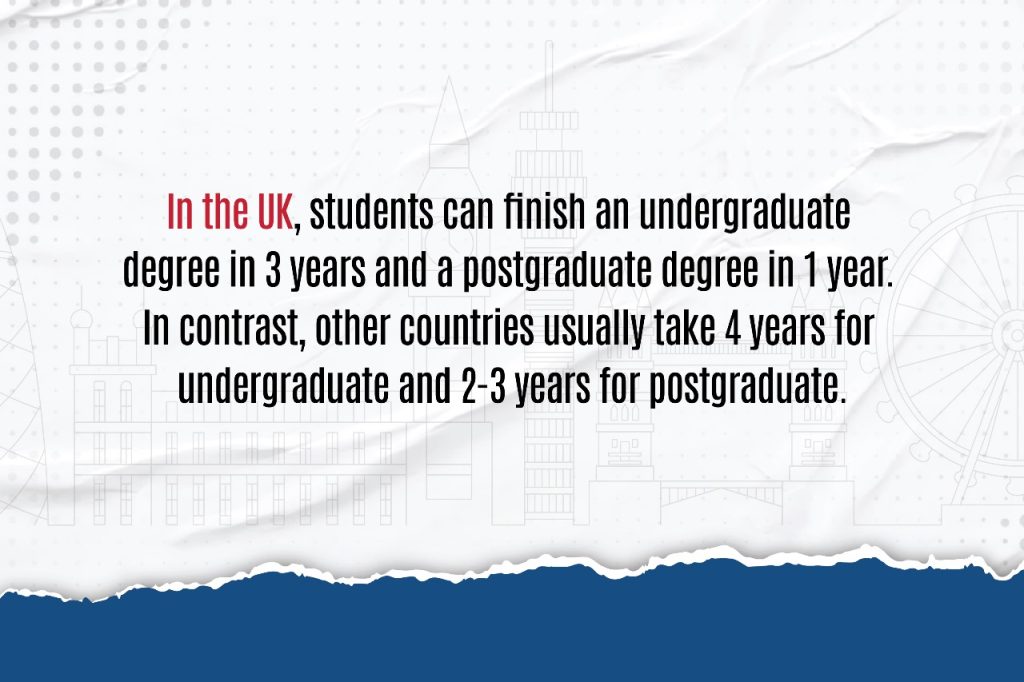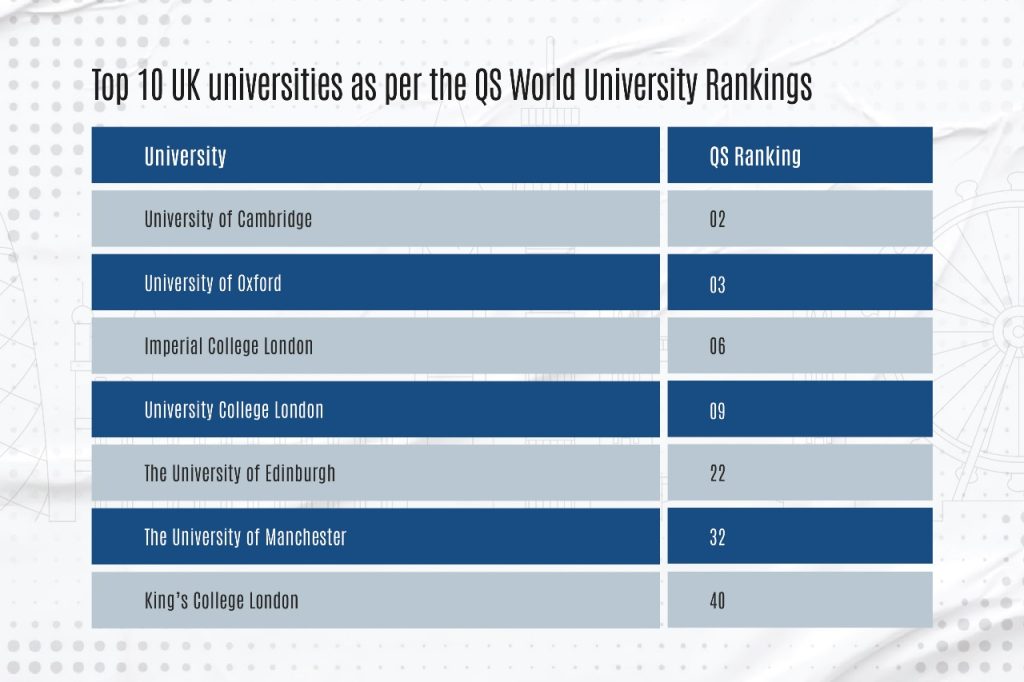The UK universities have a long history of welcoming international students, ensuring a comfortable and inclusive environment. Amidst the global array of study destinations, the United Kingdom (UK) shines as an epitome of academic excellence, cultural diversity, and myriad opportunities. Universities in vibrant cities offer abundant on and off-campus experiences. Embracing multiculturalism, the UK universities provide an opportunity to interact with diverse cultures and explore its historic landmarks, galleries, and pubs. A global reputation for high academic standards ensures enhanced job prospects.
In recent years, the UK universities has intensified efforts to attract international students, including visa changes and friendlier immigration policies. With 22% of the student population being international, the UK aims to host 600,000 international students annually by 2030.
In this blog, we’ll explore the myriad reasons why international students should consider the UK as their preferred destination for higher education.
The UK has strategically streamlined the visa and admission processes, ensuring transparency and ease for prospective students. Unlike other renowned study destinations the UK has established a notably straightforward path to university admission and obtaining a student visa, referred to as the Student Route (formerly Tier 4 visa). The UK provides two avenues for visa applications: submitting in person at a UK embassy or applying online via the official UK Government website.
The process of securing a spot at a UK university is notably efficient. Once accepted, universities offer comprehensive guidance for a seamless transition to student life in the UK. In contrast to the US system where majors are declared after enrollment, UK universities applicants choose their desired program before applying, underscoring their dedication to their chosen field.
In contrast to the rigorous IELTS score requirements imposed by other destinations like Australia and Canada, the UK sets a more accessible admission threshold. Many UK universities accept an IELTS score as low as 5.5, with some offering alternatives like the Medium of Instruction (MOI) as substitutes for IELTS. This adaptability ensures that language proficiency does not become an insurmountable hurdle for international students.
2. Affordability of Education & Scholarship Opportunities:
The financial aspect often plays a pivotal role for international students. The UK universities take this into consideration, offering a spectrum of tuition fee options that cater to diverse budget constraints. The country hosts an array of universities that extend exceptional programs to international students, with the government actively facilitating accessible and affordable education opportunities.

While esteemed universities like Oxford, Cambridge, Imperial College London, and University College London might command significant fees, most UK universities and colleges offer excellent education at an affordable rate. A plethora of scholarships and grants cater specifically to international students, further enhancing affordability. Scholarships for higher education in the UK universities are readily accessible through various sources, and it’s worth noting that each year a substantial amount of scholarship funds go untapped due to lack of applications.
3. Quality of Education:
The UK’s educational landscape offers a wide array of courses across diverse disciplines, catering to a range of interests and career aspirations. This includes arts, sciences, engineering, and business programs, providing students the flexibility to align their education with their passions. Renowned institutions like the University of Oxford, University of Cambridge, and Imperial College London underscore the UK’s academic prestige, consistently securing top global rankings and offering remarkable research prospects.

Underpinning this system is the rigorous evaluation by the Quality Assurance Agency (QAA), an independent body regularly assessing education standards in UK universities and colleges. This involves audits, subject reviews, and feedback mechanisms to elevate learning quality.
A distinguishing feature of UK education is the abbreviated course duration, enabling students to earn degrees faster without compromising educational quality. The UK’s education system excels in diversity, offering courses in both English and Welsh across various disciplines, appealing to students interested in fields like marine biology, forensic science, and language proficiency. A focus on practical knowledge cultivates critical thinking, analytical skills, and creativity among students.
4. Professional Prospects:
The UK’s post-study work visa offers international graduates the opportunity to stay and work in the country after completing their studies, enhancing their skill sets and boosting their competitiveness in the job market. The UK’s thriving economy provides abundant job openings, especially in sectors like healthcare, engineering, finance, and technology, enabling international students to launch successful careers.

Also, to manage living expenses, students can work part-time for up to 20 hours a week during term and full-time during breaks, gaining valuable industry experience. The combination of theoretical and practical teaching methods in UK universities adds value to resumes, imparting a competitive edge that transcends global work settings. The recent introduction of the Graduate route, commencing in July, further supports international students by extending their stay post-graduation, facilitating smoother career beginnings.
5. Support for International Students:
The UK’s healthcare system, ranked fifth globally by the World Health Organization (WHO), is anchored by the publicly funded NHS. The renowned National Health Service (NHS) provides international students with access to top-quality healthcare, prioritizing their overall well-being.
The UK’s living costs, though varying by city, remain reasonable, encompassing affordable accommodations, groceries, and healthcare services that enable students to manage their finances effectively. Its comparatively low living expenses, coupled with free healthcare for citizens, make it a preferred choice for many expatriates. While monthly living costs average around £1,100 to £1,300, the exact figure can vary based on factors such as location and personal lifestyle choices.

Furthermore, the UK safeguards the practice of religious beliefs through anti-discrimination laws. The nation recognizes the diverse range of beliefs that contribute to its cultural tapestry and ensures protection against discrimination in various spheres. The welcoming and inclusive society ensures religious freedom for international students, allowing them to practice their faith without limitations.
6. Quality of Life:
The UK’s multicultural society fosters a welcoming environment that values international students, promoting a sense of belonging. Interacting with peers from diverse backgrounds cultivates cross-cultural understanding and personal development. Exploring historical landmarks, museums, and cultural events offers a blend of education and recreation.
With over 14% of the population being foreign-born, international students have a unique chance to immerse themselves in a global milieu. The UK’s cities, from the vibrant energy of London to the captivating allure of Edinburgh, provide an exceptional quality of life, encompassing entertainment, cuisine, and social experiences. Public transportation systems in these cities are world-renowned, ensuring convenience and connectivity.
The UK’s rich cultural diversity, alongside its history and vibrant cities, make it a coveted destination for studying, working, and exploring. The country’s inclusive atmosphere allows international students to connect with people from various cultures while staying connected to their own heritage.
Selecting a study destination profoundly impacts one’s academic journey and personal growth. Studying in the UK universities isn’t just about education; it’s a transformative experience that expands horizons and prepares individuals for a global future. Whether in London, Glasgow, Manchester, or Nottingham, the UK offers a range of student cities to explore, promising cultural enrichment and lifelong friendships.